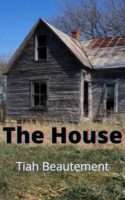Ximena bolted across the land between her home and The House, moving like she’d joined the school’s athletics team. As she rounded the corner, she skidded to a stop.
There, on the wide porch that dripped with vines, sat a young man with a banjo perched on his knee. As she burst into view, his singing ceased mid-word, his mouth agape. His hand hovered over the strings.
Ximena recovered first, “What do you think you’re doing?”
“Sorry,” he spluttered. “My new mates said I wouldn’t be disturbing anybody if I practised over here.”
“Those guys are clearly not your mates if they told you to play over here,” she said, batting away a trail of vine. “They’re trying to get you cursed. Which you may deserve if you’re playing ‘The House of the Rising Sun’ like that.”
“What are you talking about?” he said, eyes narrowing.
“That song you are singing is supposed to be from the women’s point of view, about how she fell in love with a gambling man and ended up having to work as a prostitute after he left her with his debt. The brothel was called The House of the Rising Sun.”
“Yeah, but –”
“No, listen to what I’m talking about. The Animals changed the words because they were too insecure to sing from a women’s perspective. But that’s all screwed up.”
“Huh?”
But Ximena wasn’t having any of it. “Were you aware that if you sing ‘The House of the Rising Sun’ the way you just were, from the man’s point of view, it no longer makes sense. Not really. Not if you really examine the lyrics.
“WHAT?”
Ximena rolled her eyes.
“Look,” he said, straightening up. “If you’re some messed up Bob Dylan fan, then go away. His pipes were destroyed by smoking, it’s obvious.”
Ximena snorted, hand on her hip. “My favourite versions of ‘The House of the Rising Sun’ are by Odetta and Nina Simone. They give that song much more heartbreak and soul than any man alive has ever been able to accomplish.”
“Is that so?” He raised his eyebrows, but a small smile played at his lips.
“That’s so.” Ximena gave a firm nod.
“Fine,” he said. “I’ll play it and you sing it.”
Ximena hadn’t sung since the day Papá died. Her father may have been a gambling addict, but the man had known music. It hurt when Mamá had to sell the guitar and her father’s music collection – the only non-essential possessions that could be scraped together. But, for all her father’s faults, she was going to do him proud and not allow this confused banjo-guy to destroy quality music.
As the young man’s fingers began to dance along the strings, Ximena lifted her chin and released her voice into the open air. All the pent-up emotion that had shadowed her life since the day her father left this earth was drawn up like water from a well. She knew gambling men, just like the one in the song. And she knew heartbreak and regret; she saw it written on her mother’s face every day. As Ximena dropped her voice, channelling the soul-sound of Odetta and Nina Simone, The House groaned and the vines began to sway. Neither the banjo player nor the singer noticed, caught up in the music.
As the final note lingered in the air, the young man blinked in awe of the young woman’s talent. Words failed him, and all he could do was splutter, “I’m Jordan.”
“Ximena.” She stepped forward to offer her hand when – “Ow! Oh – what fresh hell is this?”
She grabbed a fistful of vine and realised, with horror, that it was attached to her head.
***
Tell us: What would you do if you discovered part of a plant stuck to your head?


